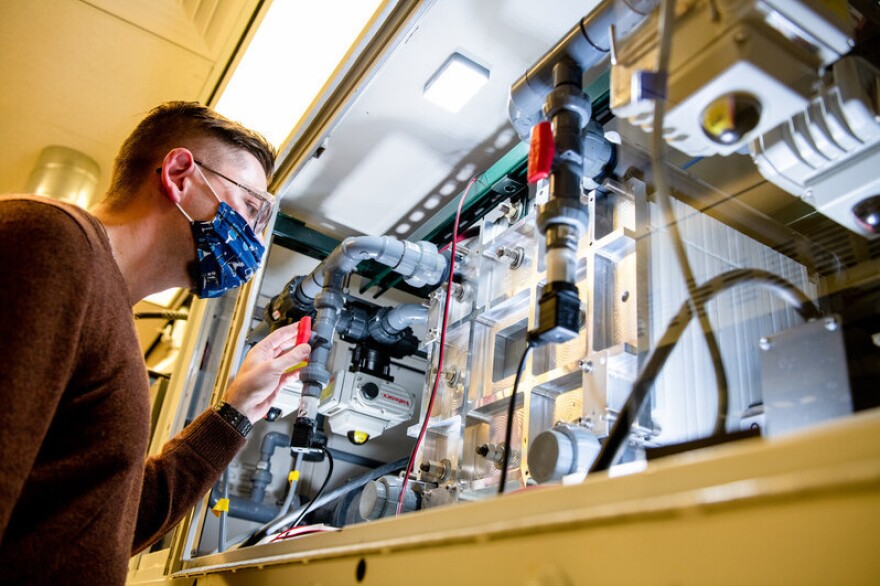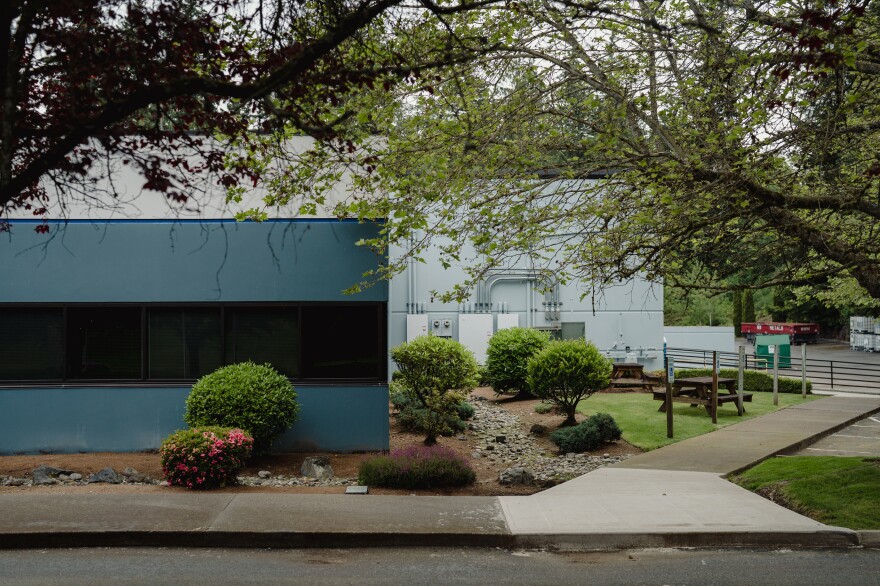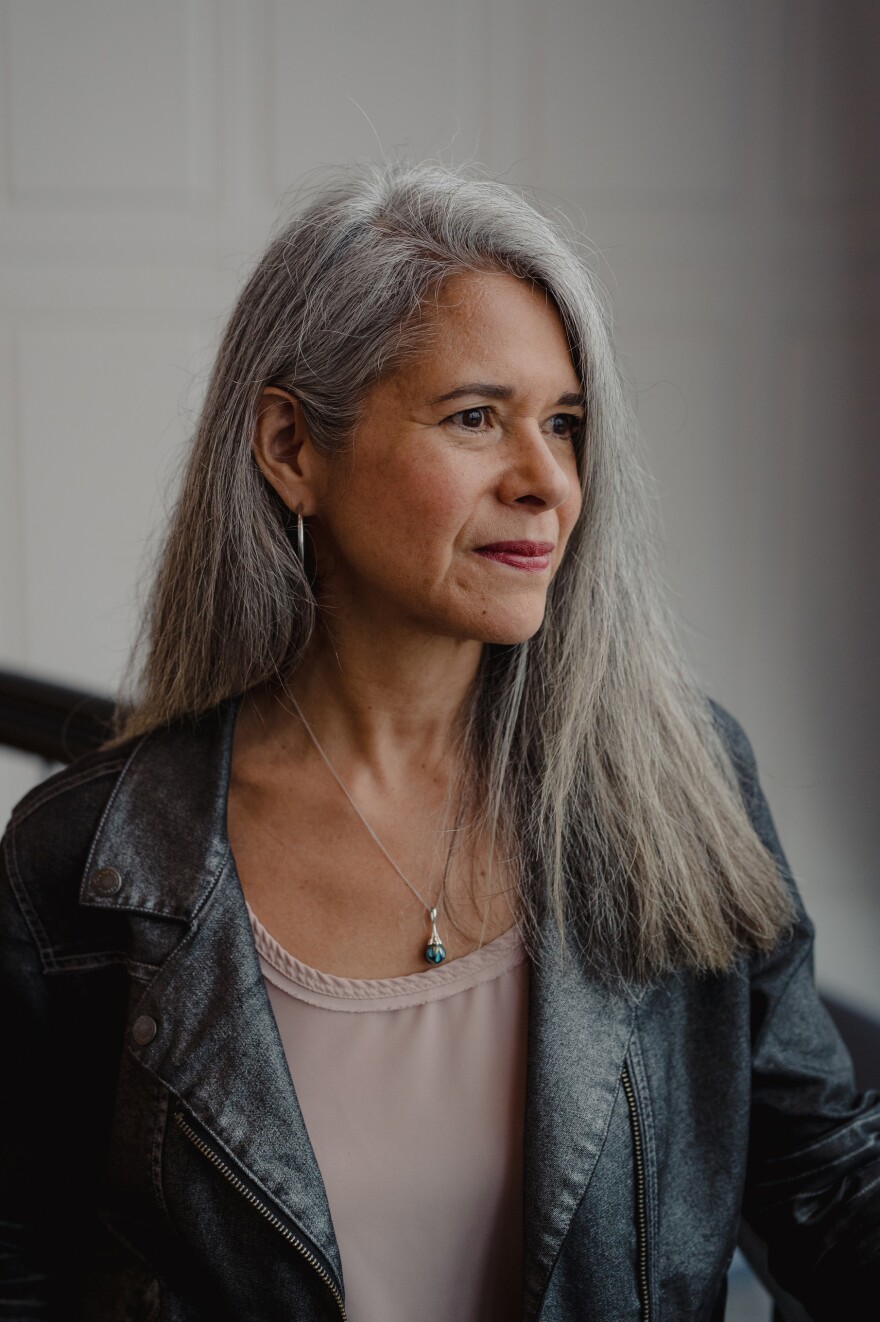When a group of engineers and researchers gathered in a warehouse in Mukilteo, Wash., 10 years ago, they knew they were onto something big. They scrounged up tables and chairs, cleared out space in the parking lot for experiments and got to work.
They were building a battery — a vanadium redox flow battery — based on a design created by two dozen U.S. scientists at a government lab. The batteries were about the size of a refrigerator, held enough energy to power a house, and could be used for decades. The engineers pictured people plunking them down next to their air conditioners, attaching solar panels to them, and everyone living happily ever after off the grid.
"It was beyond promise," said Chris Howard, one of the engineers who worked there for a U.S. company called UniEnergy. "We were seeing it functioning as designed, as expected."

But that's not what happened. Instead of the batteries becoming the next great American success story, the warehouse is now shuttered and empty. All the employees who worked there were laid off. And more than 5,200 miles away, a Chinese company is hard at work making the batteries in Dalian, China.
The Chinese company didn't steal this technology. It was given to them — by the U.S. Department of Energy. First in 2017, as part of a sublicense, and later, in 2021, as part of a license transfer. An investigation by NPR and the Northwest News Network found the federal agency allowed the technology and jobs to move overseas, violating its own licensing rules while failing to intervene on behalf of U.S. workers in multiple instances.
Now, China has forged ahead, investing millions into the cutting-edge green technology that was supposed to help keep the U.S. and its economy out front.

Department of Energy officials declined NPR's request for an interview to explain how the technology that cost U.S. taxpayers millions of dollars ended up in China. After NPR sent department officials written questions outlining the timeline of events, the federal agency terminated the license with the Chinese company, Dalian Rongke Power Co. Ltd.
"DOE takes America's manufacturing obligations within its contracts extremely seriously," the department said in a written statement. "If DOE determines that a contractor who owns a DOE-funded patent or downstream licensee is in violation of its U.S. manufacturing obligations, DOE will explore all legal remedies."
Several U.S. companies have tried to get a license to make the batteries
The department is now conducting an internal review of the licensing of vanadium battery technology and whether this license — and others — have violated U.S. manufacturing requirements, the statement said.
Forever Energy, a Bellevue, Wash., based company, is one of several U.S. companies that have been trying to get a license from the Department of Energy to make the batteries. Joanne Skievaski, Forever Energy's chief financial officer, has been trying to get hold of a license for more than a year and called the department's decision to allow foreign manufacturing "mind boggling."

"This is technology made from taxpayer dollars," Skievaski said. "It was invented in a national lab. (Now) it's deployed in China, and it's held in China. To say it's frustrating is an understatement."
The idea for this vanadium redox battery began in the basement of a government lab, three hours southeast of Seattle, called Pacific Northwest National Laboratory. It was 2006, and more than two dozen scientists began to suspect that a special mix of acid and electrolyte could hold unusual amounts of energy without degrading. They turned out to be right.
It took six years and more than 15 million taxpayer dollars for the scientists to uncover what they believed was the perfect vanadium battery recipe. Others had made similar batteries with vanadium, but this mix was twice as powerful and did not appear to degrade the way cellphone batteries or even car batteries do. The researchers found the batteries capable of charging and recharging for as long as 30 years.

Gary Yang, the lead scientist on the project, said he was excited to see if he could make the batteries outside the lab. The lab encourages scientists to do just that, in an effort to bring critical new technology into the marketplace. The lab and the U.S. government still hold the patents, because U.S. taxpayers paid for the research.
In 2012, Yang applied to the Department of Energy for a license to manufacture and sell the batteries.
The agency issued the license, and Yang launched UniEnergy Technologies. He hired engineers and researchers. But he soon ran into trouble. He said he couldn't persuade any U.S. investors to come aboard.
"I talked to almost all major investment banks; none of them (wanted to) invest in batteries," Yang said in an interview, adding that the banks wanted a return on their investments faster than the batteries would turn a profit.

He said a fellow scientist connected him with a Chinese businessman named Yanhui Liu and a company called Dalian Rongke Power Co. Ltd., along with its parent company, and he jumped at the chance to have them invest and even help manufacture the batteries.
At first, UniEnergy Technologies did the bulk of the battery assembly in the warehouse. But over the course of the next few years, more and more of the manufacturing and assembling began to shift to Rongke Power, Chris Howard said. In 2017, Yang formalized the relationship and granted Dalian Rongke Power Co. Ltd. an official sublicense, allowing the company to make the batteries in China.
Any company can choose to manufacture in China. But in this case, the rules are pretty clear. Yang's original license requires him to sell a certain number of batteries in the U.S., and it says those batteries must be "substantially manufactured" here.
In an interview, Yang acknowledged that he did not do that. UniEnergy Technologies sold a few batteries in the U.S., but not enough to meet its requirements. The ones it did sell, including in one instance to the U.S. Navy, were made in China. But Yang said in all those years, neither the lab nor the department questioned him or raised any issues.

Then in 2019, Howard said, UniEnergy Technologies officials gathered all the engineers in a meeting room. He said supervisors told them they would have to work in China at Rongke Power Co. for four months at a time.
"It was unclear, certainly to myself and other engineers, what the plan was," said Howard, who now works for Forever Energy.
Yang acknowledges that he wanted his U.S. engineers to work in China. But he says it was because he thought Rongke Power could help teach them critical skills.
Yang was born in China but is a U.S. citizen and got his Ph.D. at the University of Connecticut. He said he wanted to manufacture the entire battery in the U.S., but that the U.S. does not have the supply chain he required. He said China is more advanced when it comes to manufacturing and engineering utility-scale batteries.
"In this field — manufacturing, engineering — China is ahead of the U.S.," Yang said. "Many wouldn't believe [it]."
He said he didn't send the battery and his engineers abroad to help China. He said the engineers in that country were helping his UniEnergy Technologies employees and helping him get his batteries built.
But news reports at the time show the moves were helping China. The Chinese government launched several large demonstration projects and announced millions of dollars in funding for large-scale vanadium batteries.
As battery work took off in China, Yang was facing more financial trouble in the U.S. So he made a decision that would again keep the technology from staying in the U.S.
The EU has strict rules about where companies manufacture products
In 2021, Yang transferred the battery license to a European company based in the Netherlands. The company, Vanadis Power, told NPR it initially planned to continue making the batteries in China and then would set up a factory in Germany, eventually hoping to manufacture in the U.S., said Roelof Platenkamp, the company's founding partner.
Vanadis Power needed to manufacture batteries in Europe because the European Union has strict rules about where companies manufacture products, Platenkamp said.
"I have to be a European company, certainly a non-Chinese company, in Europe," Platenkamp said in an interview with NPR.

But the U.S. has these types of rules, too. Any transfer of a U.S. government license requires U.S. government approval so that manufacturing doesn't move overseas. The U.S. has lost significant jobs in recent years in areas where it first forged ahead, such as solar panels, drones and telecom equipment. Still, when UniEnergy requested approval, it apparently had no trouble getting it.
On July 7, 2021, a top official at UniEnergy Technologies emailed a government manager at the lab where the battery was created. The UniEnergy official said they were making a deal with Vanadis, according to emails reviewed by NPR, and were going to transfer the license to Vanadis.
"We're working to finalize a deal with Vanadis Power and believe they have the right blend of technical expertise," the email from UniEnergy Technologies said. "Our transaction with Vanadis is ready to go pending your approval ..."
The government manager responded that he needed confirmation before transferring the license and emailed a second employee at UniEnergy. The second employee responded an hour and a half later, and the license was transferred to Vanadis Power.
Whether the manager or anyone else at the lab or Department of Energy thought to check during that hour and a half or thereafter whether Vanadis Power was an American company, or whether it intended to manufacture in the U.S., is unclear. Vanadis' own website said it planned to make the batteries in China.
In response, department officials said they review each transfer for compliance and said that new rules put in place last summer by the Biden administration will close loopholes and keep more manufacturing here.
But agency officials acknowledged that its reviews often rely on "good faith disclosures" by the companies, which means if companies such as UniEnergy Technologies don't say anything, the U.S. government may never know.

That's a problem that has plagued the department for years, according to government investigators.
In 2018, the Government Accountability Office found that the Department of Energy lacked resources to properly monitor its licenses, relied on antiquated computer systems, and didn't have consistent policies across its labs.
In this case, it was an American company, Forever Energy, that raised concerns about the license with UniEnergy more than a year ago. Joanne Skievaski said she and others from the company repeatedly warned department officials that the UniEnergy license was not in compliance. In emails NPR has reviewed, department officials told them it was.
"How is it that the national lab did not require U.S. manufacturing?" Skievaski asked. "Not only is it a violation of the license, it's a violation to our country."
Now that the Department of Energy has revoked the license, Skievaski said she hopes Forever Energy will be able to acquire it or obtain a similar license. The company plans to open a factory in Louisiana next year and begin manufacturing. She bristles at the idea that U.S. engineers aren't up to the challenge.
"That's hogwash," she said. "We are ready to go with this technology."
Still, she says it will be difficult for any American company at this point to catch up. Industry trade reports currently list Dalian Rongke Power Co. Ltd. as the top manufacturer of vanadium redox flow batteries worldwide. Skievaski also worries about whether China will stop making the batteries once an American company is granted the right to start making them.
That may be unlikely. Chinese news reports say the country is about to bring online one of the largest battery farms the world has ever seen. The reports say the entire farm is made up of vanadium redox flow batteries.
This story is a partnership with NPR's Station Investigations Team, which supports local investigative journalism, and the Northwest News Network, a collaboration of public radio stations that broadcast in Oregon and Washington state.
Copyright 2023 NPR. To see more, visit https://www.npr.org.




